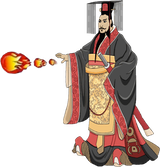On this day in 1894, the anti-colonial Donghak Peasant Rebellion began with the "Gobu Uprising", where 1,000 peasants stormed the county of Gobu, freeing prisoners, occupying government buildings, and causing the county ruler to flee.
The Donghak Peasant Rebellion was an uprising that took place in late Joseon-era Korea during the 1890s. "Donghak" refers to a religious movement, founded in 1860, which preached for social equality and the uplifting of the peasantry. Choe Jeu was executed by the state in 1864.
Amidst a backdrop of growing foreign influence in Korea (which would eventually lead to colonization by Japan), Donghak peasants rebelled against oppression by feudal rulers. The uprising began in the county of Gobu in Jeolla province, where the magistrate had extorted vast amounts of wealth and forced the peasants to build a reservoir.
On January 10th, 1894, approximately 1,000 peasant rebels gathered at an empty horse ranch, from which they split off into two separate armies where they successfully destroyed three of Gobu's four gates, occupied government offices, and set about destroying prisons and freeing the people held in them.
As rebels successfully defeated government forces, unrest would spread across the country, and the panicked Joseon dynasty called for Chinese Qing dynasty for support. Doing this, however, aggrieved the Japanese government, which was competing with China for influence over Korea.
Japan invaded Korea, occupying Seoul, triggering the First Sino-Japanese War. Following a temporary truce, the peasant rebellion would resume in October, this time directed towards the Japanese occupation.
The Japanese proved successful in defeating the uprising, however, continuing to quell rebels through 1895. Korea would become increasingly absorbed into Japan's sphere of influence before official annexation in 1910.
Megathreads and spaces to hang out:
- ❤️ Come listen to music and Watch movies with your fellow Hexbears nerd, in Cy.tube
- 💖 Come talk in the New Weekly Queer thread
- 💛 Read and talk about a current topics in the News Megathread
 Come talk in the New Weekly PoC thread
Come talk in the New Weekly PoC thread- ⭐️ September Movie Nominations ⭐️
reminders:
- 💚 You nerds can join specific comms to see posts about all sorts of topics
- 💙 Hexbear’s algorithm prioritizes comments over upbears
- 💜 Sorting by new you nerd
- 🌈 If you ever want to make your own megathread, you can reserve a spot here nerd
- 🐶 Join the unofficial Hexbear-adjacent Mastodon instance toots.matapacos.dog
Links To Resources (Aid and Theory):
Aid:
Theory:


I was reading about Chinese history yesterday, the Song dynasty to be specific, and holy shit. China damn near almost had an industrial revolution in like the 10th~13th century. Song China produced more steel than 19th century Britain.
But here’s what really blew my fucking mind: how modern Chinese society sounded. There were public libraries and professional sports teams.
Imagine if a Song dynasty industrial revolution (analogous to our history’s industrial revolution in Europe) had happened, and technology advanced at a similar pace; the posting age would have begun in the 1500s or something.
The question is, why didn't they have an industrial revolution then?
Steel (Or cast iron? I think it was cast iron first) isn't everything. You also need the emergence of a bourgeoisie and the proletarianization that results. I'm pretty sure the Song dynasty was one of the least averse to merchants, which is something it had going for it as far as industrialization. However, the industrial revolution in England actually started with the textile industry, not steam and steel! I can't find numbers on employment, but I reckon it's easier to employ millions in textile manufacturing and also have a market for it than starting with iron. And of course the Mongols coming in to smash the Song probably didn't help. Also, labor-saving technologies aren't going to be used if you have an enormous cheap labor supply. IIRC there's a bunch of academic work on China's agricultural involution that is a result of this.
They got invaded by mongols
What were you reading?
Wikipedia.